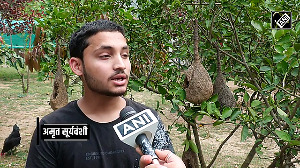Paras Adenwala is the Chief Investment Officer, ING Vysya Mutual Fund. He joined ING Vysya in 2005 and has around 16 years of experience in equities. Over here, he advises investors on stock investing and talks about his own investing style.
His advice to investors
Consider equity
Don't ignore equity just because the market is volatile and falling. Equity must be considered as an investment. It is the only investment that beats inflation comfortably.
In fact, now is a good time to consider equity. Scores of stocks are currently undervalued.
Take a long-term perspective
When investing in equity, take a long-term perspective -- three years at the least.
People who invest in real estate do so with at least a 10-year time frame in mind. Even with gold, people buy and hold. No one wants their provident fund money in a hurry. Art is a very long term investment that passes on to generations sometimes.
So why, when it comes to equity, do people always thinking of selling and making a quick profit? People are obsessed with selling. This mentality has to change. There should be a paradigm shift in the way investors view equity.
Look at a mutual fund
The market is too complex, and too volatile, for a retail investor to enter on his own. The days of easy money are over, where whatever stock you bought used to rise. Now you will have to go by fundamentals.
It is best to invest via a mutual fund. Even with a fund, don't look at exiting just because the units have gone up slightly. Or think of selling because of a loss when markets dip. Trust your fund manager. Give him a chance. You cannot view returns over a few days or even a few months. Just like shares, I suggest at least a three-year time frame. Don't let your fund be a medium of speculation.
A Systematic Investment Plan is the best bet. Here, too, I recommend a three-year time frame to ride an entire cycle. Even then, an investor should pull out only if he needs the money. Else, just stay invested. The longer you stay invested in a SIP, the better your returns.
When picking a fund, don't just go by what is being recommended, do your homework. Check out Value Research, Mutual Funds India, My Iris, Crisil, India Infoline and do your homework. Always read up about your fund manager. Look at the pedigree of the fund house.
Don't worry about the state of the market
Though the days of easy money are gone, equity still has growth opportunities.
It will even be tough for IPOs. They will start quoting at discounts and may not even get adequately subscribed to.
As for the FIIs leaving, I don't think that is cause for worry. They will be back. India is one of the fastest growing economies at 6.5% to 7% over the next five years. Money goes where the opportunity is. And the Indian economy has tremendous opportunity. Moreover, the index companies are growing at 2.5 times the GDP.
Taking a three-year period into account, I feel mid-caps will outperform large caps. No doubt, they are illiquid in a falling market. But they still offer great growth prospects and a huge variety that you cannot find in large-caps. If you want to invest in biotech or clinical research, you will not get a large cap stock.
I refer back to my earlier statement: now is a good time to get into equity but with a long-term perspective in mind.
His investing styleWe are bottom-up, not top-down.
When we like a stock and are comfortable with its valuation, we go for it.
We give a lot of importance to a company's quality of management, business leadership potential, quality of business and visibility of business.
Risk control is as important as delivering returns. We do have those parameters in place too. For instance, we don't go overboard by buying into a stock or sector that we are bullish on. We do draw limits when considering how much of each stock we should buy or how much should we invest into a single sector.
We also have purchase and sell points in place. When the price of a stock drops to that level, it makes for a good buy. If it rises to a particular level, we consider selling it.
Of course, we don't blindly follow this as a formula. We use these points as a trigger when monitoring the stock. Has the price risen simply because of speculation or is it due to some development? If it is the latter, then we may not sell. But, if we find it overpriced, we sell.
You asked me earlier if I view investing as an art or science; it is both. It is an art because one masters it only from experience. There is no strict formula that can be followed. At the same time, it is a science because it helps polish one's gut feeling. All the above factors and parameters ensure we are on track.
On the poor performance of ING fundsWe are making a complete U-turn. In fact, I believe we have turned the corner. And investors have noticed it.
A year ago, we were managing Rs 1,627 crore (Rs 16.27 billion). Out of this, Rs 93.39 crore (Rs 934 million) was in equity.
A year down the road, as on May 31, 2006, we are managing Rs 4,005 crore (Rs 40.05 billion) with around Rs 623 crore (Rs 6.23 billion) in equity.
Since 2004, there have been many organisational changes and when I took over in 2005, I brought about even more changes. We now have systems and processes in place.
Initially, we had huge exposure to certain sectors or stocks. Our portfolios would be skewed to just a few favourite ones. That is no longer the case. Diversification is now mandatory. We have measures in place to provide risk protection. We have our own internal limits to determine how much of the portfolio (maximum amount) should be invested in one stock or sector.
For instance, no more than 10% of the fund's portfolio will be in cash at any point. In very volatile market, though, we could go higher and increase our cash levels. No more than 10% of the fund's portfolio will be in one single stock and no more than 25% in one single sector.
Our team has changed and we have new people on board. We are four on the equity side (we plan to recruite one more later) and we have three people on the debt side. Initially, we had one fund manager looking after all the equity funds. Now we have fund managers for separate funds.
I regularly meet with my team to discuss our investment strategy. Whenever an analyst comes up with a recommendation, a research note must accompany it. We advocate strong investment arguments backing up a recommendation.
Of course, every investment has to be constantly updated. Like I mentioned earlier, we also have price limits to indicate when we should exit or enter a stock.
During the past one year, ING has put a greater emphasis on research, software, processes and diversification.
Sure, my funds are not large at the moment but that works out to my advantage. It is easier for smaller funds to perform and deliver, to move in and out of stocks. The problem of flexibility arises when a fund is managing more than Rs 1,000 crore.
I really don't care if people are still sceptical of us because it is only easier for me to prove them wrong. If you look at the last quartile performance, our funds have been top performers.
ING has changed and we are going to be a fund house to reckon with. If you don't believe me, just watch the numbers.
Read what other fund managers have to say:
A K Sridhar: The best way to invest in the stock market
Sandip Sabharwal: 'Stock picking is about conviction'
Tridib Pathak: Why you must invest in stocks
Balasubramanian: How I pick my stocks
Anand Shah: Investing in stocks? Minimise the risk
Naresh Kumar Garg: Pick funds wisely this year
J Venkatesan: Stock picking is an art






 © 2025
© 2025